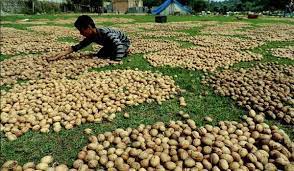
As rates slump, walnut industry seeks govt help
High-quality walnut kernels spread outside the shops on polythene sheets with a group of men racing against time to pack these kernels in small boxes before the big truck parked near the market leaves for Delhi.
It’s a common sight in a small market in village Lagama, just five kilometres ahead of the border town of Uri on the Srinagar-Muzaffarabad road. For decades the market has been known for walnuts, and not much has changed here in terms of modernisation.
The techniques of new age marketing, pricing and selling directly to consumers are yet to reach this small place. When it comes to selling their produce, the market seems to be stuck in decade-old traditions and techniques that help hundreds of families living close to the Line of Control (LoC) survive.
A picturesque village Lagama and Uri has around more than 50 shops that exclusively buy kernels from marginal farmers and growers. “Our business pattern has been the same as it was decades ago,” said Owais Ahmad Khawaja, 35, whose father and grandfather were also in this business.
“In 2014, we were fetching ₹1300 to ₹1400 for a kilogram of the walnut kernel. Now the prices have come down to half,” Khawja said, who usually dispatches 5000 to 6000 kilograms of walnut kernels outside the state annually.
“All the traders put their produce in a big truck every day, which is then sent to Delhi or any other state,” he said.
Walnut is one of the organic fruits grown in Kashmir, especially in the countryside. However, despite good production, it’s the most unorganised sector in the state. “The prices of kernels are always decided by traders sitting in Delhi. They buy from us at the price of peanuts and then export the same and make good money,” said Javeed Ahmad, another trader, who frequently visits Delhi in connection with the sale of walnut kernels.
Officials claim that under organic cultivation, 1.85 lakh tonnes of fruit was produced in Kashmir and 85,000 tonnes in the Jammu region and most of the produce was walnut. Anantnag and Kupwara top the state in walnut cultivation with 11,939 and 8,797 hectares under production. Over the past 40 years, the state has seen an astronomical rise in walnut production from 10,500 tonnes to 2.7 lakh tonnes in 2012. Kashmir produces 80% of the country’s walnuts.
Scientists at Sher-e-Kashmir University of Agricultural Sciences and Technology, Kashmir (SKUAST) are now working on a selection of 25-30 varieties to produce new varieties of walnuts. Five varieties of walnuts, Suleman, Hamdan, Central Institute of Temperate Horticulture (CITH) 1, 2, 3 are produced in different parts of Kashmir, and these new varieties could enhance the production. “It’s the most unorganised sector, and the government also ignores it despite the fact hundreds of families earn their livelihood by selling walnut kernels. Everything here is done manually,” said Mohammad Amin Chalkoo, a trader in Uri. “For the growers and commission agents, it seems the market isn’t promising. Since we don’t know any other trade so we have to continue with this trade only,” he said. “It’s ironic not a single trader among us was exporting the produce directly as we don’t have the money nor support from the government,” said one of the prominent buyers in Uri.
Typically, each grower produces 50 to 100 kilograms of kernels per year, which are then dried and sold.
“Every day villagers come with their produce, and we pay them in cash. At times people from neighbouring districts also bring their produce to this market due to its good trade reputation,” said Chalkoo, sitting in one of the big shops where the kernels are being packed. “We hope there is a turnaround in the market on Diwali. The trade begins in August and ends in the first week of November. We then close our shops and wait for the next season,” he said.
Mursleen Baig, another aged trader, said, “There should be a special focus on walnuts as an organic produce then only this will bring dividends for us.”

